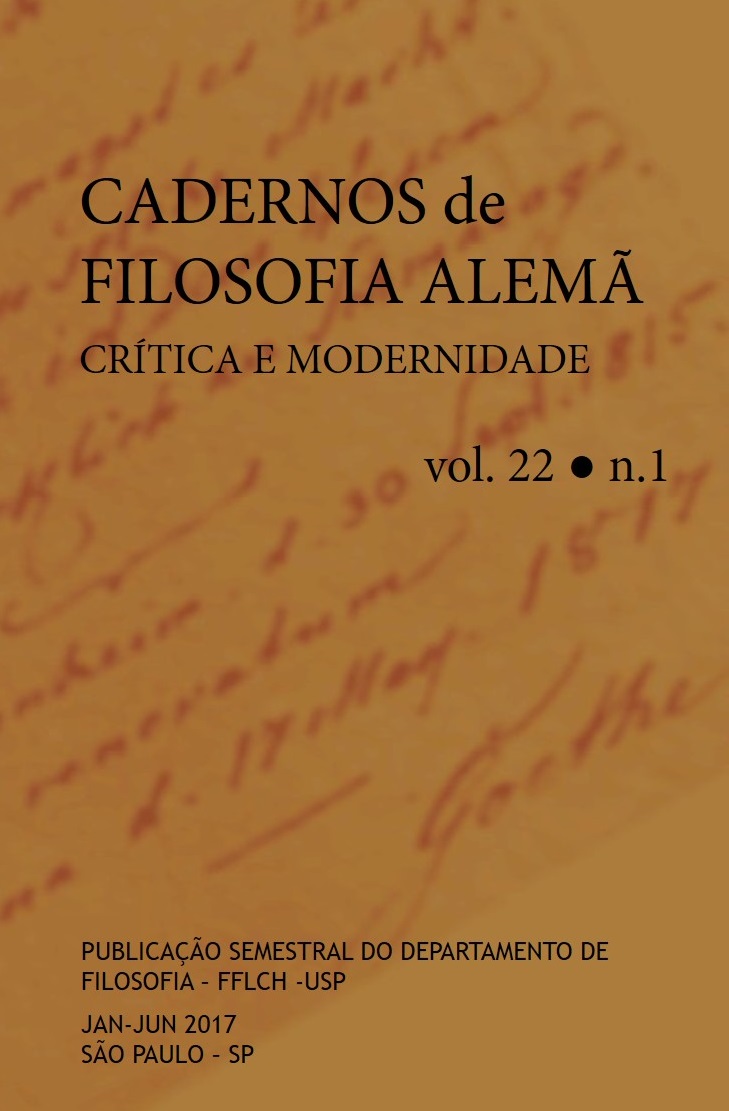Democracy against the pathologies of Freedom: Power and Domination in Franz L. Neumann
DOI:
https://doi.org/10.11606/issn.2318-9800.v22i1p115-138Keywords:
critique, domination, freedom, pathology, powerAbstract
This article presents Franz Neumann’s conceptual framework present in the text "The Concept of Political Freedom", whose main purpose is to differentiate power and domination. For Neumann, political theory should consist of a reflection on the effectiveness of freedom in legitimate forms of power, which are characterized by ensuring the realization of human freedom. Freedom, in the author's view, is composed of three elements, the legal, the cognitive and the volitional, which allow to identify six pathologies of freedom that result from excessive appreciation or depreciation of each of its elements; respectively, autocracy and legalism, fear and naturalization, alienation and voluntarism. With the use of this conceptual apparatus Neumann analyses specific political problems such as the McCarthyism in the 1950s United States of America.
Downloads
References
Habermas, J. (1997). Direito e Democracia: Entre Facticidade e Validade. Rio de Janeiro: Tempo Brasileiro.
Honneth, A. (2008). “Uma patologia social da razão: Sobre o legado intelectual da Teoria Crítica”. In: Rush, F. (org.). Teoria Crítica. Aparecida: Ideias & Letras.
____________. (2015). O Direito da Liberdade. São Paulo: Martins Fontes.
Intelmann, P. (1996). Franz Neumann. Chancen und Dilemma des politischen Reformismus. Baden-Baden: Nomos Verlagsgesellschaft.
Iser, M.; Strecker, D. (orgs.). (2002). Kritische Theorie der Politik. Franz L. Neumann – eine Bilanz. Baden-Baden: Nomos Verlagsgesellschaft.
Kelly, D. (2003). The state of the political: conceptions of politics and the state in the thought of Max Weber, Carl Schmitt and Franz Neumann. New York: Oxford.
Neumann, F. (2013). O conceito de liberdade política. Cadernos de Filosofia Alemã, 22, pp.107-154.
____________. (2013). O Império do Direito. São Paulo: Quartier Latin.
Offe, C. (2003). The problem of social power in Franz L. Neumann’s Thought. Constellations, 10 (2).
Perels, J. (ed.). (1984). Recht, Demokratie und Kapitalismus. Aktualität und Probleme der Theorie Franz L. Neumanns. Bade-Baden: Nomos Verlagsgesellschaft.
Rodriguez, J. R. (2009). Fuga do Direito: um estudo sobre o direito contemporâneo a partir de Franz Neumann. São Paulo: Saraiva.
____________. (2016). Perversão do Direito (e da Democracia): seis casos. Revista Direito & Práxis, 7(4), pp.261-294.
Scheuerman, W. E. (1997). Between norm and exception: the Frankfurt school and the rule of law. Cambridge: MIT Press.
Söllner, A. (1982). Neumnann zur Einführung. Hannover: Soak Verlag.
Thornhill, C. (2000). Political theory in modern Germany – an introduction. Oxford: Polity.
Weber, M. (1993). “A Política como Vocação”. In: Ciência e política: duas vocações. São Paulo: Ed. Cultrix.
Downloads
Published
Issue
Section
License
Information and conceptions on the texts are complete responsibility of the authors.
All the articles submitted before July 5th 2018 and those published after July 2021 are licensed under a CC BY-NC-ND license – except those published between the aforementioned dates, which are under the CC BY-NC-SA license. The permission for the translation of the material published under the license CC BY-NC-ND by third parts can be obtained with the consent of the author.
Open access policies - Diadorim
Rules applied before July 5th 2018:
Presenting a submission to our Editorial Board implies granting priority of publication for “Cadernos de filosofia alemã”, as well as transferring the copyright of texts (once published), which will be reproduced only with the manifest authorization of the editors. Authors keep the right to reuse the texts published in future editions of their work, without paying any fees to "Cadernos”. We will not grant the permission to re-edit or translate the texts for third parts without agreement of the author.


